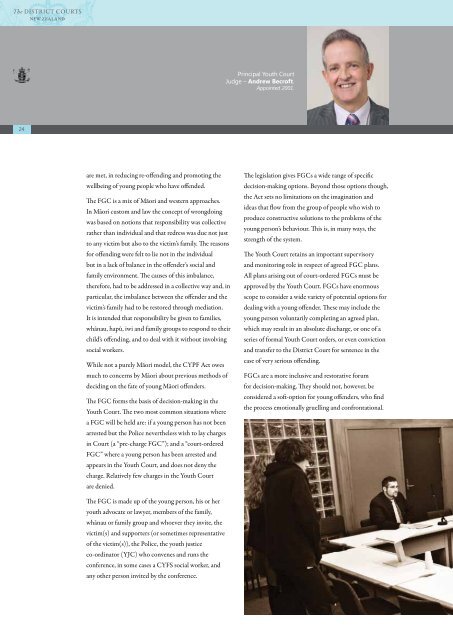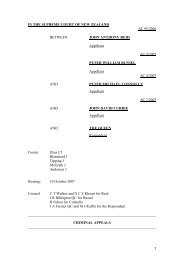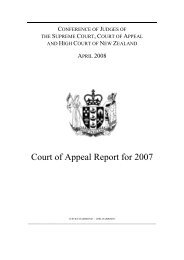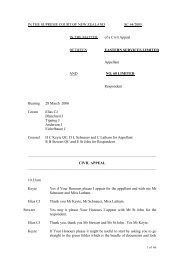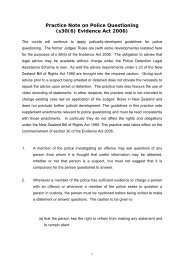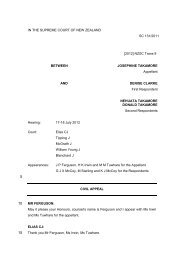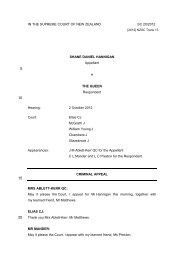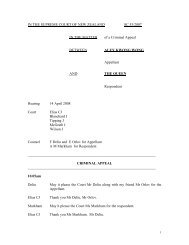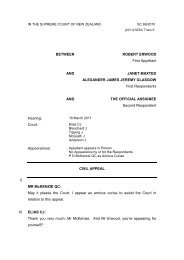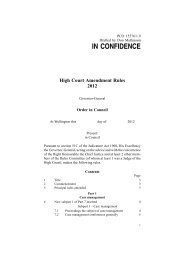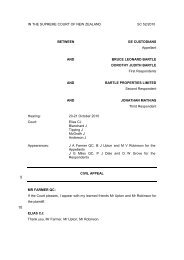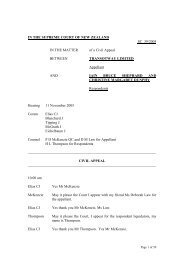DISTRICT COURTS - Courts of New Zealand
DISTRICT COURTS - Courts of New Zealand
DISTRICT COURTS - Courts of New Zealand
Create successful ePaper yourself
Turn your PDF publications into a flip-book with our unique Google optimized e-Paper software.
The <strong>DISTRICT</strong> <strong>COURTS</strong><br />
NEW ZEALAND<br />
Principal Youth Court<br />
Judge – Andrew Becr<strong>of</strong>t.<br />
Appointed 2001.<br />
24<br />
are met, in reducing re-<strong>of</strong>fending and promoting the<br />
wellbeing <strong>of</strong> young people who have <strong>of</strong>fended.<br />
The FGC is a mix <strong>of</strong> Māori and western approaches.<br />
In Māori custom and law the concept <strong>of</strong> wrongdoing<br />
was based on notions that responsibility was collective<br />
rather than individual and that redress was due not just<br />
to any victim but also to the victim’s family. The reasons<br />
for <strong>of</strong>fending were felt to lie not in the individual<br />
but in a lack <strong>of</strong> balance in the <strong>of</strong>fender’s social and<br />
family environment. The causes <strong>of</strong> this imbalance,<br />
therefore, had to be addressed in a collective way and, in<br />
particular, the imbalance between the <strong>of</strong>fender and the<br />
victim’s family had to be restored through mediation.<br />
It is intended that responsibility be given to families,<br />
whānau, hapū, iwi and family groups to respond to their<br />
child’s <strong>of</strong>fending, and to deal with it without involving<br />
social workers.<br />
While not a purely Māori model, the CYPF Act owes<br />
much to concerns by Māori about previous methods <strong>of</strong><br />
deciding on the fate <strong>of</strong> young Māori <strong>of</strong>fenders.<br />
The FGC forms the basis <strong>of</strong> decision-making in the<br />
Youth Court. The two most common situations where<br />
a FGC will be held are: if a young person has not been<br />
arrested but the Police nevertheless wish to lay charges<br />
in Court (a “pre-charge FGC”); and a “court-ordered<br />
FGC” where a young person has been arrested and<br />
appears in the Youth Court, and does not deny the<br />
charge. Relatively few charges in the Youth Court<br />
are denied.<br />
The legislation gives FGCs a wide range <strong>of</strong> specific<br />
decision-making options. Beyond those options though,<br />
the Act sets no limitations on the imagination and<br />
ideas that flow from the group <strong>of</strong> people who wish to<br />
produce constructive solutions to the problems <strong>of</strong> the<br />
young person’s behaviour. This is, in many ways, the<br />
strength <strong>of</strong> the system.<br />
The Youth Court retains an important supervisory<br />
and monitoring role in respect <strong>of</strong> agreed FGC plans.<br />
All plans arising out <strong>of</strong> court-ordered FGCs must be<br />
approved by the Youth Court. FGCs have enormous<br />
scope to consider a wide variety <strong>of</strong> potential options for<br />
dealing with a young <strong>of</strong>fender. These may include the<br />
young person voluntarily completing an agreed plan,<br />
which may result in an absolute discharge, or one <strong>of</strong> a<br />
series <strong>of</strong> formal Youth Court orders, or even conviction<br />
and transfer to the District Court for sentence in the<br />
case <strong>of</strong> very serious <strong>of</strong>fending.<br />
FGCs are a more inclusive and restorative forum<br />
for decision-making. They should not, however, be<br />
considered a s<strong>of</strong>t-option for young <strong>of</strong>fenders, who find<br />
the process emotionally gruelling and confrontational.<br />
The FGC is made up <strong>of</strong> the young person, his or her<br />
youth advocate or lawyer, members <strong>of</strong> the family,<br />
whānau or family group and whoever they invite, the<br />
victim(s) and supporters (or sometimes representative<br />
<strong>of</strong> the victim(s)), the Police, the youth justice<br />
co-ordinator (YJC) who convenes and runs the<br />
conference, in some cases a CYFS social worker, and<br />
any other person invited by the conference.


